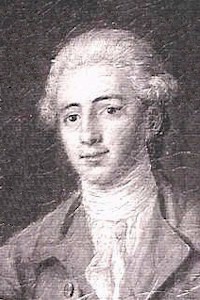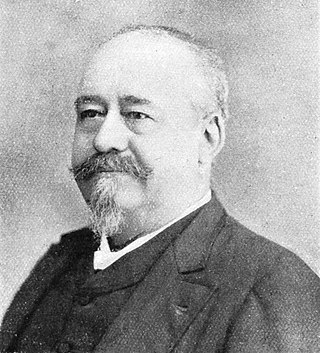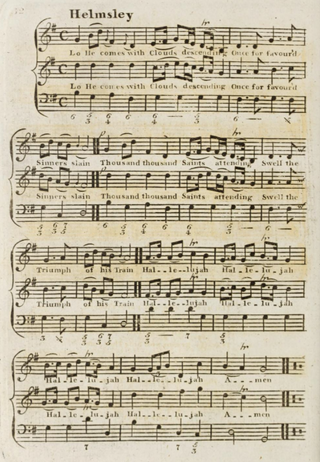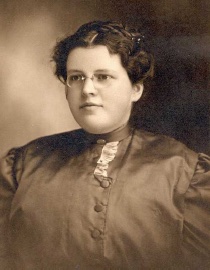Way-worn traveler variationThe words, as found in the 1902 publication, are as follows: Deliverance Will Come - I saw a wayworn traveler, in tattered garments clad,
- And struggling up the mountain, it seemed that he was sad;
- His back was laden heavy, his strength was almost gone,
- Yet he shouted as he journeyed, "Deliverance will come!"
- Then palms of victory, crowns of glory,
- Palms of victory I shall wear.
- The summer sun was shining, the sweat was on his brow,
- His garments worn and dusty, his step seemed very slow;
- But he kept pressing onward, for he was wending home,
- Still shouting as he journeyed, "Deliverance will come!"
- Then palms of victory, crowns of glory,
- Palms of victory I shall wear.
- The songsters in the arbor that stood beside the way
- Attracted his attention, inviting his delay:
- His watchword being "Onward!" he stopped his ears and ran,
- Still shouting as he journeyed, "Deliverance will come!"
- Then palms of victory, crowns of glory,
- Palms of victory I shall wear.
- I saw him in the evening; the sun was bending low;
- He'd overtopped the mountain, and reached the vale below:
- He saw the Golden City, "his everlasting home"
- And shouted loud, "Hosanna! Deliverance will come!"
- Then palms of victory, crowns of glory,
- Palms of victory I shall wear.
- While gazing on that city, just o'er the narrow flood,
- A band of holy angels came from the throne of God;
- They bore him on their pinions safe o'er the dashing foam,
- And joined him in his triumph: Deliverance had come!
- Then palms of victory, crowns of glory,
- Palms of victory I shall wear.
- I heard the song of triumph they sang upon that shore,
- Saying, "Jesus has redeemed us to suffer nevermore!"
- Then casting his eyes backward on the race which he had run,
- He shouted loud, "Hosanna! Deliverance has come!"
- Then palms of victory, crowns of glory,
- Palms of victory I shall wear.
Additional stanzas were published in the 1888 Songs of Pilgrimage: A Hymnal for the Churches of Christ: [21] - His eyes were dim and heavy, his body weak and way,
- Therefore his Brother gave him a couch to lie upon;
- And closed the blinds around him, and locked him up alone,
- That nothing might disturb him, till deliverance should come.
- Hope made for him a pillow, and faith a garment rare,
- To wrap him in his slumbers, till Christ his home prepare.
- But when the dawn of morning broke in his little room,
- He rose, and cried "Hosanna! Deliverance has come!"
- Then I heard the song of triumph he sung upon that shore,
- Saying, "Jesus has redeemed me, to suffer never more;"
- And casting his eyes backward on the race that he had run,
- He shouted loud, "Hosanna! Deliverance has come!"
The chorus has been translated into German as follows: - Denn Siegespalmen
- Und Ehrenkronen,
- Siegespalmen sind unser Lohn. [22]
| Bloodwashed pilgrim variationThe song has also been sung with the title "The Bloodwashed Pilgrim", using different words and the same tune: [23] - I saw a blood washed pilgrim, a sinner saved by grace,
- Upon the King's highway, with peaceful, shining face;
- Temptations sore beset him, but nothing could afright;
- He said, "The yoke is easy, the burden, it is light."
- Refrain
- Then palms of victory, crowns of glory,
- Palms of victory I shall wear.
- His helmet was salvation, a simple faith his shield,
- And righteousness his breastplate, the spirit's sword he'd wield.
- All fiery darts arrested, and quenched their blazing flight;
- He cried "The yoke is easy, the burden, it is light."
- Refrain
- I saw him in the furnace; he doubted not, nor feared,
- And in the flames beside him, the Son of God appeared;
- Though seven times 'twas heated, with all the tempter's might,
- He cried, "The yoke is easy, the burden, it is light."
- Refrain
- 'Mid storms, and clouds, and trials, in prison, at the stake,
- He leaped for joy, rejoicing, 'twas all for Jesus' sake;
- That God should count him worthy, was such supreme delight,
- He cried, "The yoke is easy, the burden, is so light."
- Refrain
- I saw him overcoming, through all the swelling strife,
- Until he crossed the threshold of God's eternal life;
- The crown, the throne, the scepter, the name, the stone so white,
- Were his, who found, in Jesus, the yoke and burden light.
- Refrain
|











